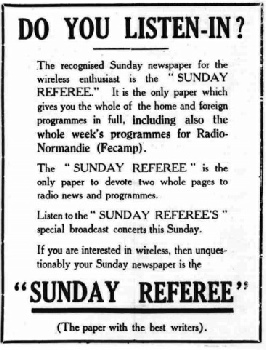© 2014-

Sunday Referee
The Sunday Referee was an important link in the history of the 1930s commercial radio broadcasts to Britain from the European continent.
The Sunday Referee had  its origins in 1877 when the Weekly Dispatch produced a companion paper primarily covering sports news -
its origins in 1877 when the Weekly Dispatch produced a companion paper primarily covering sports news -
In April 1931 the Sunday Referee was put up for sale by its owner, Sir Oswald Stoll, and was acquired by Isidore Ostrer of the Gaumont British Picture Corpora tion. The publisher of the paper was identified as the Sunday Referee Publishing Company of 17 Tudor Street, London EC4.
tion. The publisher of the paper was identified as the Sunday Referee Publishing Company of 17 Tudor Street, London EC4.
The front page masthead of the Sunday Referee carried the the slogan "The national newspaper for all thinking men and women". The majority of its pages showed the paper's interest in sport, but there was also a range of general news, features and show business gossip typical of the Sunday press.
When Ostrer first bought the paper, its circulation was around 20,000 copies per week. The new ownership, change of management and injection of capital should have boosted the circulation figures, but its sales remained stubbornly low for a viable national Sunday newspaper.
In a bid to increase i ts circulation the Sunday Referee sponsored an hour (4-
ts circulation the Sunday Referee sponsored an hour (4-
Sunday on Radio Paris and this helped increased sales to about 160,000 copies in just over a year.
As well as purchasing airtime to publicise itself the paper was actively supportive of commercial radio and the IBC in particular. This was due mainly to the presence on its staff of Valentine Smith, as its Circulation and Distribution Manager. In 1928, Smith, while working for the Daily Mail, had chartered a yacht Ceto to advertise the paper and its insurance scheme through speakers as it cruised round the British coast.
The 'presenter' of this output from the Ceto was Stephen Williams, who had also worked for the Daily Mail, and who had also now moved to the Sunday Referee with Smith. Both men were highly enthusiastic about the possibilities of commercial radio, and the Sunday Referee introduced a weekly page of publicity for Radio Normandy and later the IBC network.
This publicity and editorial support from the Sunday Referee ensured that a considerable audience became aware of Radio Normandy and the IBC.
The Sunday Referee launched "The International Broadcasting Club" and within three weeks nearly 50,000 applications had been received at the paper's office and in less than three months the Club had more than a quarter of a million members.
However the Sunday Referee’s support of commercial radio came at a price -
Almost 18 months later, in November 1934 the Sunday Referee was able to rejoin the NPA but from that point its involvement with -
The need to publicise the continental commercial stations was met by the creation of Radio Pictorial in January 1934 and this magazine subsequently became the only major source of information for British listeners on the content of the the stations' broadcasts.
The Sunday Referee ceased publication in 1939 when it merged with the Sunday Chronicle.



Advert for the sale of the Sunday Referee, 16th February 1931
Press advert for the Sunday Referee, 6th May 1935
Daily Mail yacht Ceto
Click here for full history

